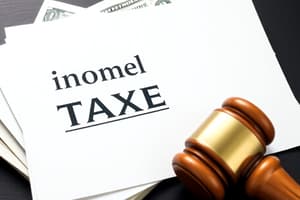Podcast
Questions and Answers
What protects the taxpayer from unconstitutional, unjust, or unreasonable tax laws?
What protects the taxpayer from unconstitutional, unjust, or unreasonable tax laws?
- The President's power to veto tax bills
- Due process and equal protection of the laws (correct)
- Non-imprisonment for non-payment of poll tax
- Exemption of religious, charitable, or educational entities from property taxation
Why does the government have the right to compel people to pay taxes?
Why does the government have the right to compel people to pay taxes?
- To ensure reciprocity in duties of protection and support (correct)
- To fund the President's veto power
- To exercise unlimited power over its citizens
- As per the recommendation of the Supreme Court
Which entity is exempt from property taxation?
Which entity is exempt from property taxation?
- State governments
- Foreign embassies
- Non-profit cemeteries (correct)
- Publicly traded companies
Why is the concurrence of the majority of Congress members needed for a law granting tax exemption?
Why is the concurrence of the majority of Congress members needed for a law granting tax exemption?
What principle justifies taxes as being used for the benefit of the public?
What principle justifies taxes as being used for the benefit of the public?
What protects the taxpayer from potential abuse by Congress in making tax laws?
What protects the taxpayer from potential abuse by Congress in making tax laws?
What is the primary purpose of taxation?
What is the primary purpose of taxation?
What is one of the inherent limitations on the power of taxation?
What is one of the inherent limitations on the power of taxation?
Which of the following is NOT a non-revenue purpose of taxation?
Which of the following is NOT a non-revenue purpose of taxation?
What is the necessary step before taxes can be imposed?
What is the necessary step before taxes can be imposed?
What is a characteristic of the power of taxation?
What is a characteristic of the power of taxation?
Which of the following is NOT an inherent power of a sovereign state?
Which of the following is NOT an inherent power of a sovereign state?
Flashcards are hidden until you start studying
Study Notes
Purpose of Taxation
- The primary purpose of taxation is to raise revenue for the government to defray its expenses.
- Taxation can also be used to achieve social and economic objectives, such as regulating inflation, minimizing the adverse effects of certain activities, and promoting equitable distribution of wealth.
Nature of Taxation
- Taxation is an inherent power of a sovereign state, along with eminent domain and police power.
- The power of taxation is legislative, meaning tax laws must be enacted before taxes can be imposed.
- The power of taxation is considered plenary, subject only to constitutional and inherent limitations.
Limitations on the Power of Taxation
- Taxes can only be levied for public purposes.
- The government may only levy taxes on persons and properties within its jurisdiction.
- The power to create tax laws rests with the Congress and cannot be delegated, except as expressly allowed by law.
- Government entities are exempt from taxation due to international comity.
Constitutional Limitations on the Power of Taxation
- Due process and equal protection of the laws must be upheld in taxation.
- Taxes must be uniform and equitable.
- The President has the power to veto tax bills.
- A law granting any tax exemption requires the concurrence of the majority of the members of the Congress.
- The Supreme Court has the power to make final judgments on tax cases.
- Non-payment of poll tax is not punishable by imprisonment.
- Religious, charitable, or educational entities, non-profit cemeteries, and churches are exempt from property taxation.
- Revenues and assets of non-stock, non-profit educational institutions are exempt from taxation.
Theory and Basis of Taxation
- The government has the right to compel those within its jurisdiction to pay taxes, as it provides protection and support to its people.
- The benefits received principle states that taxes are used for the benefit of the public.
Studying That Suits You
Use AI to generate personalized quizzes and flashcards to suit your learning preferences.




